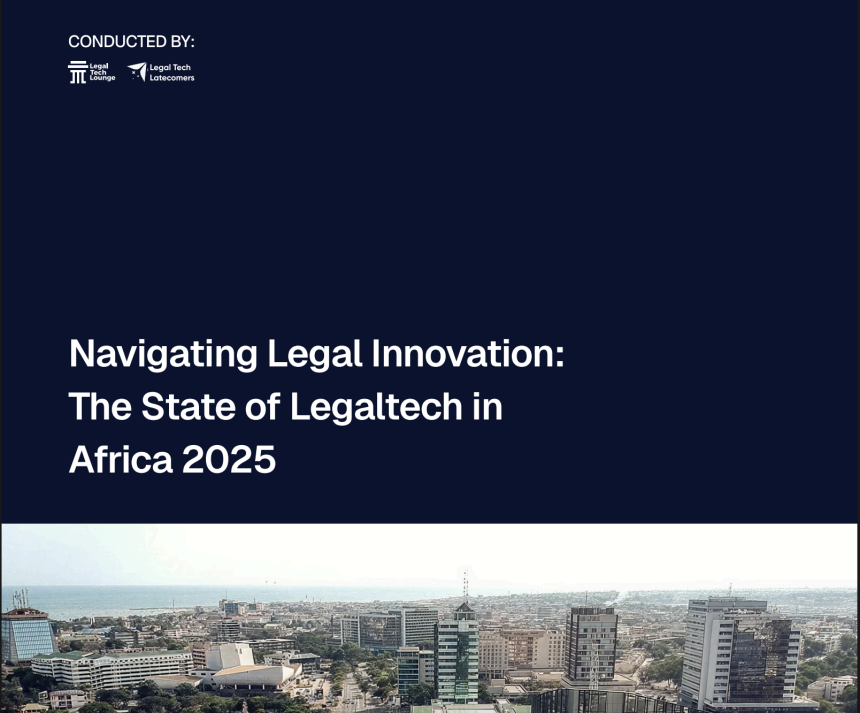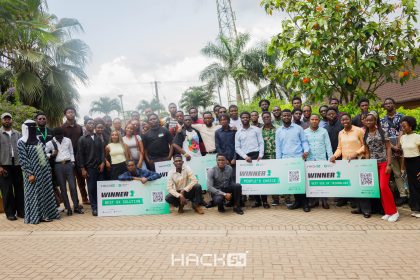In a continent where access to justice remains a pressing challenge, the intersection of law and technology holds immense promise.
The inaugural “State of Legaltech in Africa 2025” survey report, a collaborative effort between Legal Tech Latecomers and Legaltech Lounge, offers a timely snapshot of this evolving landscape.
Launched in 2024 at the Accra Lawtech Hangout—Africa’s largest legal tech event, which drew around 400 attendees from diverse backgrounds—the report draws on responses from legal professionals, innovators, and stakeholders primarily in Ghana and beyond.
While participation was lower than hoped, reflecting broader hurdles in survey engagement, the insights paint a picture of cautious optimism: awareness is growing, but adoption lags due to practical barriers. This article reviews the report’s findings, highlighting opportunities, challenges, and pathways forward for Africa’s legaltech ecosystem.
Awareness and Adoption: A Gap Between Knowledge and Action
One of the report’s core objectives was to gauge familiarity with legaltech tools—software and platforms designed to streamline legal processes like research, drafting, and case management. The results reveal a mixed reality.
Over half (56.8%) of respondents reported awareness of such tools, a positive sign of increasing visibility. However, only 21.6% currently integrate them into their daily work, with 18.9% having used them in the past and a small 2.7% claiming no prior knowledge.
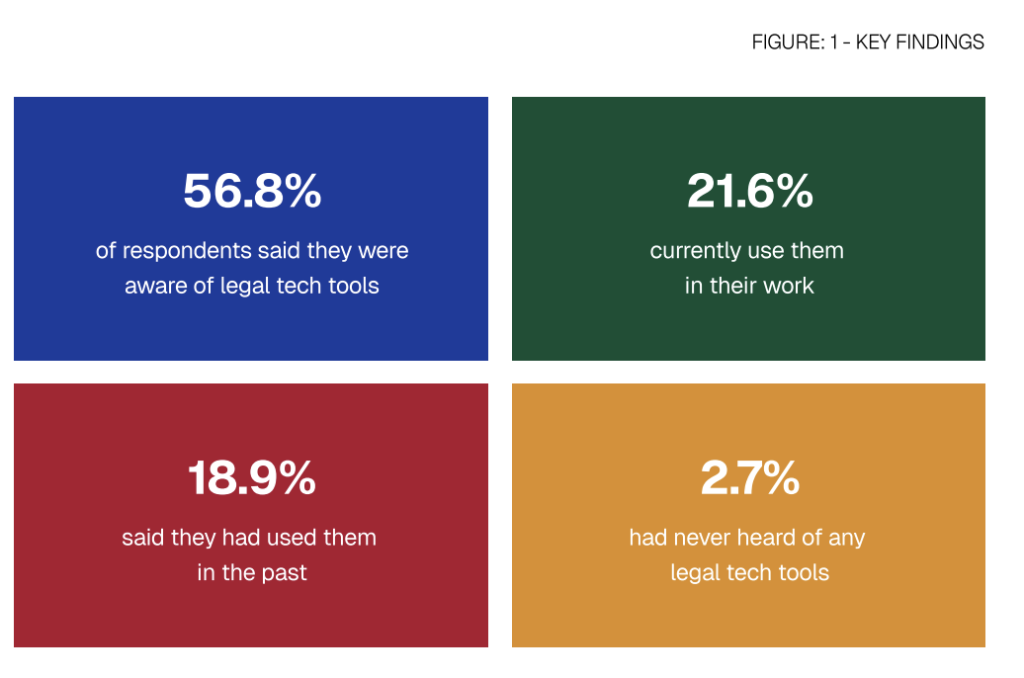
Notably, local platforms like Judy Legal, Law Pavilion, and Dennis Law were mentioned more frequently than international ones, underscoring the appeal of solutions tailored to African legal systems. This preference suggests that homegrown innovations are gaining traction, as they better address regional nuances in common law, civil law, or hybrid frameworks.
Yet, the data highlights a clear disconnect: while 80% of respondents use general digital tools (e.g., Microsoft 365 or basic productivity apps) in their workflows, specialized legaltech remains underutilized. As the report notes, this indicates openness to technology but a need for more seamless, context-specific integrations.
Tools in Use and Their Impact
Among users, the most popular tools focus on efficiency in core legal tasks. Document management systems top the list at 17.7%, followed closely by case management and practice management software, each at 16.1%. These tools are making the biggest difference in research (40.3% of impacts) and document drafting (24.2%), areas ripe for automation due to their repetitive nature.
Contract review (16.1%) and client management (9.7%) follow, while risk assessment (3.2%) lags, pointing to a focus on internal efficiencies over client-facing or predictive applications.
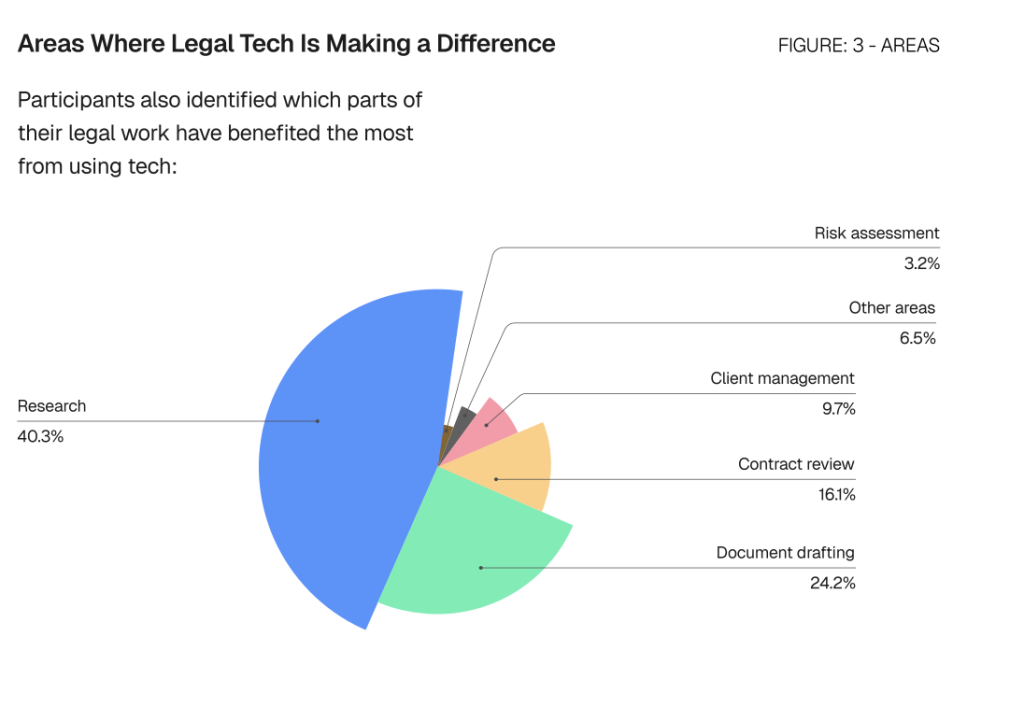
The extent of integration is still nascent. Nearly half (43.2%) of respondents say legaltech supports just 1-25% of their work, with only 5.4% reporting 76-100% facilitation. Despite this, even limited use yields tangible benefits.
Respondents described faster task completion—such as reducing research time by a quarter using platforms like Dennis Law—along with improved collaboration through real-time document editing. Reduced errors in grammar, formatting, and references were also common, enhancing accuracy under pressure.
Overall, time savings emerged as the top benefit (42.6%), followed by reduced errors (23.5%), enhanced collaboration (16.2%), and better client service (13.2%).
Barriers: Why the Slow Uptake?
Despite the evident advantages, adoption remains sluggish. The report identifies key motivators for potential users: ease of use (38.7%), cost (24.0%), and integration with existing systems (17.3%). Conversely, barriers include a lack of awareness, high costs, insufficient training, and resistance to change.
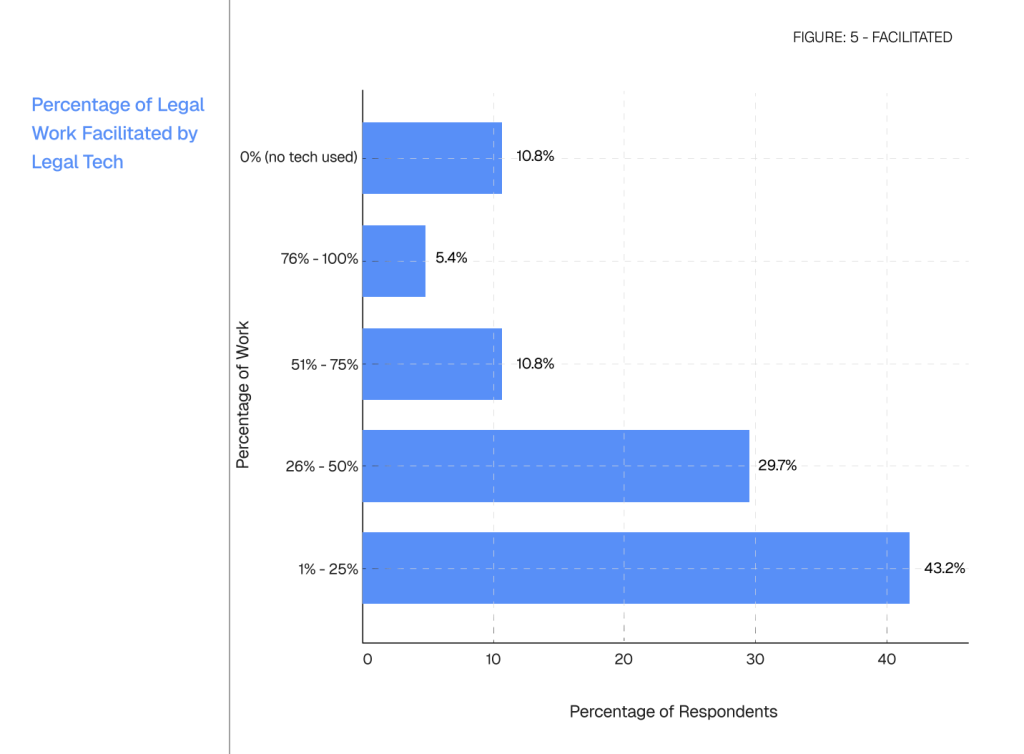
Privacy and confidentiality concerns loom large, especially in Ghana and similar jurisdictions where legal professionals prioritize client data protection. Without clear assurances on compliance with local ethics rules, many stick to trusted manual methods.
A deeper issue is the lack of exposure. Many lawyers know tools exist but lack hands-on guidance, making the shift feel daunting. The report also notes structural challenges: 48.6% of decisions on tech adoption come from management, while 16.2% are team-driven, emphasizing the need for top-down buy-in.
In essence, while interest is high, the ecosystem lacks the training, affordability, and trust to convert curiosity into routine practice.
What’s Missing and What’s Next
The report doesn’t shy away from gaps. African legal systems’ unique requirements—such as specific court structures and cultural contexts—are often overlooked in imported tools, leading to frustration. There’s also a collaboration deficit: developers build in silos, either without legal input or vice versa, resulting in mismatched products. Education is another blind spot; most law schools still teach traditional methods, leaving graduates underprepared for a tech-infused future.
Looking ahead, respondents are enthusiastic about AI-powered tools (over 90% interest), automation for contracts and admin tasks, and cloud-based collaboration platforms. Ideas include AI for case law briefing, dispute prediction, court transcription, and risk analysis—all designed for African realities like mobile compatibility, low-data usage, and offline functionality.
Training needs center on practical, hands-on sessions in AI, machine learning, and prompt engineering, plus seminars and newsletters to normalize legaltech discussions.
Recommendations: Building a Stronger Ecosystem
The report closes with actionable advice for stakeholders:
- Tech Developers: Collaborate closely with lawyers from the outset, incorporating domain expertise to avoid “hallucinations” in AI models like ChatGPT. Prioritize features like mobile access and transparency on limitations, especially for public-facing tools. Involve African legal professionals in training and evaluation to ensure cultural relevance.
- Law Firms and Professionals: Start small—pilot tools in one area like research or billing—then scale. Actively shape innovations to bridge access-to-justice gaps, fulfilling a professional duty.
- Policy Makers and Regulators: Simplify court processes digitally, fund legaltech education in universities, and craft practical data privacy rules that enable rather than hinder innovation.
- Donors and Investors: Back African-led startups solving real problems, fund non-profits like Legal Aid Commission for efficiency tools, and support hackathons and research to scale ideas.
A Roadmap for Transformation
This report marks a pivotal first step in documenting Africa’s legaltech journey, one still in its early stages but brimming with ambition. As forewords from Jonelle Oteng-Nyame (Legal Tech Latecomers) and Michel Nkansah (Legaltech Lounge) emphasize, the focus must shift from trendy tools to those addressing urgent needs, like improving access to justice.
With events like the upcoming Accra Lawtech Hangout 2025 on November 27, momentum is building. If stakeholders heed these insights—fostering partnerships, investing wisely, and prioritizing user-centric design—legaltech could revolutionize legal practice across the continent, making it more efficient, inclusive, and equitable.



